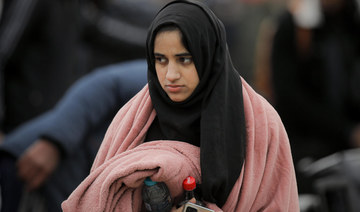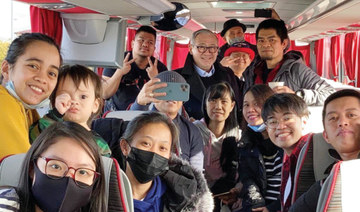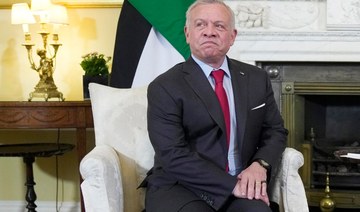RIYADH/JEDDAH: Ukrainians living in Saudi Arabia have been watching the news, concerned for the safety of their families and friends, and alarmed by events in their home country.
“Missiles, sirens all the time, explosions in this area, and bomb shelters,” said 23-year-old Ukrainian Kateryna Tkachenko, who lives in Jeddah. “This is all the news that we've been getting since it began.”
The Russia-Ukraine crisis has devastated and displaced many, with explosions lighting up the skies and air raid sirens sounding throughout the country.
Those who spoke to Arab News shared their feelings of dread and angst as they received frantic calls from loved ones back home, describing the situation as “devastating.”
Tkachenko said her friends and family, who decided to stay in their homes, had placed blankets and mattresses in the corridor and put tape on the windows so the glass would not shatter in the event of an explosion.
“My loved one is in the center of Kyiv at the moment. He couldn't go to the shelter because his collarbone is broken,” Tkachenko told Arab News. “He stayed home alone, and so far, it's the safest place he can make for himself.”
With hopes of the COVID-19 pandemic ending soon, Tkachenko said that she and her friends had begun discussing their futures, choosing career paths, and all that had come to a standstill.
Olena Solodovnyk, 28, works at a beauty salon in Jeddah. She said she and her family members could not believe a war was happening and felt completely powerless.
“My whole family is in different cities and I am very worried about their fate. It is not easy to understand what’s happening with this situation, you cannot do anything,” Solodovnyk told Arab News. “I thank God that my parents are now in Pavlograd and are safe, but we pray and worry about my sister with children who live near Kyiv.”
Pavlograd is a city and municipality in central east Ukraine, located within the Dnipropetrovsk Oblast. It is the administrative center of Pavlograd Raion with a population of around 100,000.
“Some of my relatives could leave the country or go west to the Carpathians (a mountain range across central and eastern Europe),” Solodovnyk said. “The worst thing is my friends, who are now in Kyiv and hide in bomb shelters and spend the night in the subway.
“Every day of my life starts with the fact that I call and write to everyone, to make sure they’re alive. What is happening now is terrible. It changes your attitude toward life and values.
“It's just so scary because you come to realize that every time you say 'I love you' or ‘Goodnight' or ‘Please take care' or ‘Stay safe,’ it might be the last time or the last words you're telling this person,” said Tkachenko.
Irina Bloxham who has been living in the Kingdom for 22 years, has been following the news closely from Riyadh. She told Arab News: “We are very concerned about what's going to happen to our families — to Ukraine in general. And on the other hand, it's: ‘What can we do for our country?’”
Bloxham, who works as the recreation manager of Braira, a valley resort in Riyadh, added: “Besides being concerned for my family back home, I’m just afraid that they will absolutely destroy the country and the nation, but we are strong and Ukraine will be free soon.”
Bloxham, who is originally from Kharkiv near the Russian border, said that being away from home made it very difficult at this critical time and that, while they were scared, they were very proud of how the Ukrainian people, army men, women and children were handling the threat.
“We are not defeated, we are fighters and we are braves,” she said.
Jeddah resident Alyona Malinovskaya told Arab News that nobody expected war to break out. She said she saw the news online while at home.
Although she left the country three years ago, she still had family and friends living in Ukraine.Since the crisis between Russia and Ukraine escalated, she had been in communication with her family every three hours every day in order to make sure they were alright.
“So far, they are doing fine and I am glad to hear this,” she said. “Unfortunately, it is a war and we are trying to survive this devastating situation and I hope we get through it soon.”
Both Bloxham and Malinovskaya felt the need to be with their fellow Ukrainians and to help them anyway they could, even though the situation was tough.




























